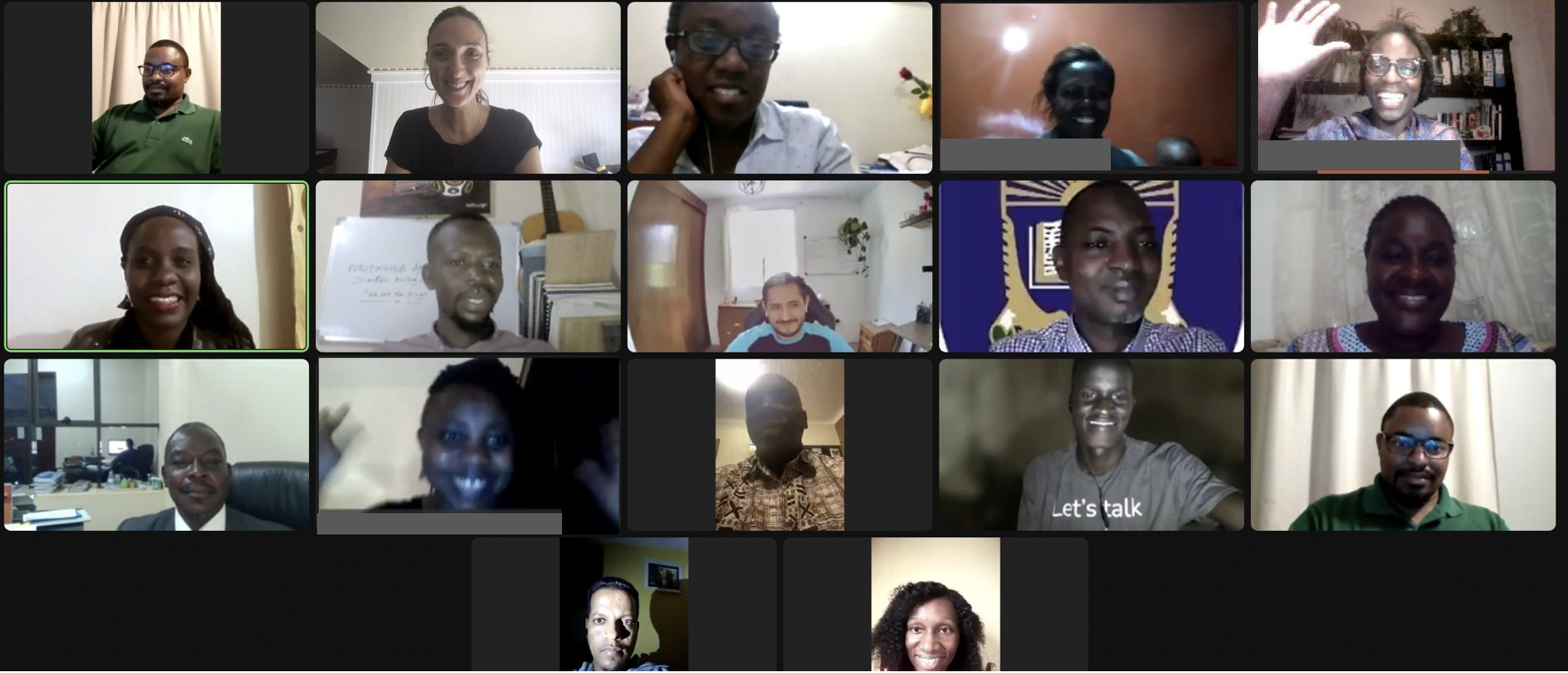Over the past 18 months, AfricArXiv, Eider Africa, eLife, PREreview, and the Training Centre in Communication Africa (TCC Africa) have collaborated to develop a peer-review training workshop called Open Peer Reviewers in Africa, tailored to the region-specific context of African researchers.
Together we co-created and openly shared tools and strategies for scholarly literature evaluation, and trained the first cohort of 11 African researchers. With this blog post we aim to summarize the fruits of this collaboration, and highlight the profile and work of the 5 trainees who have moved on to be open peer review trainers themselves.
Goals & Approach
When we started this collaboration, we had three main goals in mind:
- To build capacity and enthusiasm for scholarly open review of preprints among African researchers;
- To provide opportunities to actively participate in peer review and gain recognition through community engagement;
- To help decolonize the academic publishing process by creating equitable opportunities for African researchers to learn together, lead and teach others.
Our approach towards these goals focused on 5 key principles:
- Co-creation: Leveraging existing peer-review training and other resources developed by each partner independently, we worked together to co-create training materials adapted to the context of African scholarly publication and cultures.
- Localization of content and multilingualism: We recognize that the African continent is large and rich with many different cultures and languages.
- Train-of-trainer model: We recruited 12 African researchers via a nomination process to participate in this pilot. Selection criteria included the ability and desire of potential trainees to attend all modules of our workshop and become trainers themselves to pass it on to their communities.
- Openness: Materials used to deliver the workshop were all shared in their original form with all participants, and also turned into templates and shared publicly on Zenodo under CC BY 4.0 (see below for a complete list and links).
- Ongoing support: In addition to being provided with our resources, 11 trainees who completed the workshop were paired with a member of our team who made themselves available to offer logistical support and mentorship to those who wished to host their own training based on our resources. We also created communication channels to share opportunities and experiences on WhatsApp and Slack.
About the training
The training had four learning objectives:
- Acknowledge and reflect on how the legacy of systems of oppression manifest in the peer-review process;
- Identify, reflect on, and address personal biases and assumptions in peer review;
- Learn best practices to write a manuscript review for a journal or independently in response to/addressing a preprint;
- Access opportunities to participate in the open peer review of preprints and build a public profile as a reviewer.
The training was delivered between May and June 2022, facilitated by various members of our team, representative of all partner organizations. Of the 12 selected, 11 participated in all four modules, received 200 GBP compensation, and a certificate of participation. As a result of a collaborative review exercise led by our team during the third module, participants authored rapid PREreviews and collaboratively wrote a full PREreview published on the PREreview website and on Zenodo.
Resources shared
Templates of all resources used in the workshop were shared publicly on Zenodo under CC BY 4.0 in English, French, and Arabic languages:
- Trainer guide in English (original), French (translated), and Arabic (translated)
- Module I Template Slide Deck in English (original), French, and Arabic
- Module II Template Slide Deck in English (original), French, and Arabic
- Module III Template Facilitation Document in English (original), French, and Arabic. This document is meant to help facilitators lead a preprint review journal club in the context of Module III of the workshop.
- Module III Template Assignment Document in English (soon to be translated into Arabic and French). This document is a template for facilitators to share with workshop participants as asynchronous assignment following the journal club in the context of Module III of the workshop.
Trainers’ spotlight

Of the 11 fully trained researchers who joined the first cohort of Open Peer Reviewers in Africa last spring, 5 have since taught the workshop themselves to their own research communities, bringing the total of African-based researchers trained so far to about 100. Most of the participants were early- to mid-career researchers, working in life-science or library-science-related fields and spread across 9 African countries: Cameroon, Egypt, Ethiopia, Ghana, Kenya, Namibia, Nigeria, Senegal, and Zambia. Below we highlight the profile of the researchers who participated in the pilot and facilitated their own Open Peer Reviewers in Africa workshop.



Dr. Mekolle Enongene Julius says of the program:
Being trained, and having the opportunity to train peers in the 'Open Peer Reviewers In Africa' platform was an exciting opportunity to understand and practice the science of peer reviewing. This will surely improve the quality of scientific writing in our context.

Ms. Mercury Shitindo says of the program:
This training demystified the peer-review process and most importantly, how to eliminate bias from it.

What’s next
The collaboration and its outputs have shown the benefit of working with people who share similar goals and values in research, and involving those at the center of an identified issue. The outcome is a set of training resources that we hope will go a long way in transforming, enriching and increasing the diversity of contributions in research communication and evaluation.
Since the pilot ended, TCC Africa has partnered with CABI Agriculture and Bioscience to train early-career editors on best practices of peer review, with a particular focus on raising awareness around common biases and assumptions that manifest in the peer-review process. Learn more about this collaboration here.
On their new website, AfricArXiv maintains an info portal about the program, listing the resources with all translations, and has included the training in their roadmap and concepts for upcoming projects in promoting preprints to the journal article publishing workflow, including community-based open peer review.
Our goal for next steps is to ensure that the resources created are of benefit to researchers in Africa more widely. We plan to do more outreach to ensure that as many potential reviewers as possible are aware of these resources, and can use them to support their development of open, fair, and rigorous reviewing of research outputs.
The next Open Peer Reviewers in Africa workshop will be led by one of the 1st cohort trainers, Dr. PaaNii Johnson, and it is scheduled to happen in person at the WACREN 2023 conference, taking place in mid March in Accra, Ghana. Read more about this conference on the WACREN 2023 webpage, check out the program, and register to attend.
Our team is actively searching for other funding and partners to support the further scaling of this program so that researchers around the world will be able to participate and benefit from it, contextually tailored to their region and the specific challenges they encounter in conducting peer review. We have started this effort by translating the resources into two other languages (French and Arabic) to ensure it reaches some of those for whom English is not their first or working language. We hope to expand this to more languages in the future.
If you would like to talk to us and find out more about participating in the program or offering this to your community, please get in touch via one of the methods below.
Stay connected
If you would like to learn more about this work, please contact info@tcc-africa.org, info@africarxiv.org, info@eiderafricaltd.org, openreviewers@prereview.org, and/or community@elifesciences.org.
Follow us on social media and keep up to date:
AfricArXiv: Twitter @AfricArXiv | LinkedIn | Facebook | Instagram
Eider Africa: Twitter @EiderAfrica | LinkedIn | Eider Africa YouTube|Eider Africa Facebook
eLife: Twitter @eLife | @eLifeCommunity | LinkedIn | Mastodon: @eLife@fediscience.org | eLife Facebook
PREreview: Twitter @PREreview_ | Mastodon @prereview@mas.to | LinkedIn | Blog
TCC Africa: Twitter @TCC Africa | LinkedIn | Facebook
Acknowledgments
This project built on a collaboration that started in January 2020 between PREreview, Eider Africa and TCC Africa, and was funded by the Wellcome Trust via a ‘Research Enrichment – Diversity and Inclusion’ grant. The collaboration continued in 2021 under eLife’s ongoing grant from Wellcome for “Shaping the future of science communication.”
We thank Georgia Bullen, Executive Director of Superbloom, for facilitating the initial discussion between the partner organizations, and Kora Korzec, former eLife Head of Communities who contributed to the grant writing and helped greatly manage this collaboration.
We also thank community members Lamis Yahia, Rachida Namoune, Salem Youssef, Roseline Dzekem Dine, and Aboubakry Dia for their contributions to the Arabic (LY, RN, SY) and French (RDD, AD) translations of the workshop materials.
About the partner organizations
About AfricArXiv
AfricArXiv is a community-led digital archive for African research, working towards building an African-owned open scholarly repository; a knowledge commons of African scholarly works to catalyze the African Renaissance. We partner with established scholarly repository services to provide a platform for African scientists of any discipline to present their research findings and connect with other researchers on the African continent and globally. Find out more about AfricArXiv at https://info.africarxiv.org.
About Eider Africa
Eider Africa is an organization that conducts research, co-designs and implements collaborative, offline and online research mentorship programs for scholars in Africa. We train mentors to start their research mentorship programs. We believe in peer-to-peer learning, learning research by practice, caring for the whole researcher and lifelong learning. We have grown a vibrant community of researchers in our research Africana journal clubs and work with university lecturers to develop transformative inclusive research training. Learn more at https://eiderafricaltd.org.
About eLife
eLife transforms research communication to create a future where a diverse, global community of scientists and researchers produces open and trusted results for the benefit of all. Independent, not-for-profit and supported by funders, we improve the way science is practised and shared. From the research we publish, to the tools we build, to the people we work with, we’ve earned a reputation for quality, integrity and the flexibility to bring about real change. eLife receives financial support and strategic guidance from the Howard Hughes Medical Institute, Knut and Alice Wallenberg Foundation, the Max Planck Society and Wellcome. Learn more at https://elifesciences.org/about.
About the Training Centre in Communication (TCC Africa)
TCC Africa is the first African-based training centre to teach effective communication skills to scientists. TCC Africa is an award-winning Trust, established as a non-profit entity in 2006 and is registered in Kenya. TCC Africa provides capacity support in improving researchers' output and visibility through training in scholarly and science communication. Find out more about TCC Africa at https://www.tcc-africa.org/about.
About PREreview
PREreview is an open project fiscally sponsored by the non-profit organization Code for Science and Society. Our mission is to bring more equity and transparency to the scholarly peer-review process. We design and develop open-source infrastructure to enable constructive feedback to preprints, we run peer review mentoring and training programs, and we partner with like-minded organizations to organize events that provide opportunities for researchers to create meaningful collaborations and connections, defeating cultural and geographical barriers. Learn more about PREreview at https://prereview.org.
